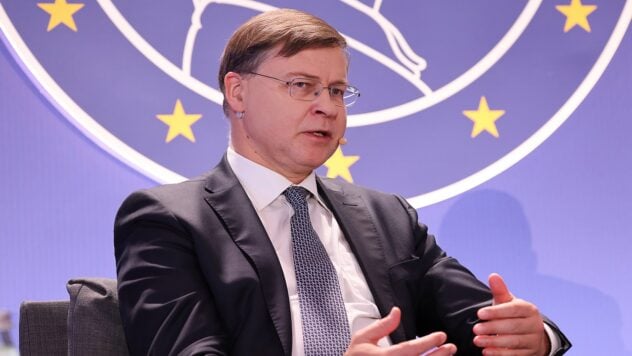The European Union is working on a 15th package of sanctions against Russia, which will include restrictions on the shadow fleet of the Russian Federation, thanks to which the Kremlin is trying to circumvent previous sanctions of the EU and the G7 countries, which provide for the establishment of a cap on the price of Russian oil.
This was stated by the Executive Vice-President of the European Commission Valdis Dombrovskis.
The EU is preparing sanctions against the shadow fleet of the Russian Federation
— When we apply sanctions, Russia tries to find a way to circumvent them. Therefore, this is precisely why we must actively work against such attempts. One of the elements of the future 15th sanctions package will definitely be measures against ships involved in the so-called shadow fleet of the Russian Federation, which is used to circumvent the price cap on (marine, — Ed.) oil, — he said.
The EU official noted that this should be on the agenda of EU countries.
Now watching
The effectiveness of sanctions against Russia: a dispute between Dombrovskis and Szijjarto
As Ukrinform writes, Dombrovskis also argued with Hungarian Foreign Minister Peter Szijjarto, who was present at the briefing as a representative of the Hungarian EU presidency.
As part of the dispute, Szijjarto once again stated that the EU policy regarding sanctions against Russia is wrong and allegedly harms the EU economy. Moreover, the Hungarian Foreign Minister claimed that attempts to use sanctions to “bring Russia's economy to its knees” in order to end the fighting in the Russian-Ukrainian war allegedly failed.
Dombrovskis responded to this:
— I want to say that sanctions are working. We provide regular updates to member states on the impact of the Russian war on the European economy, including the impact of sanctions… If you look at the effect of sanctions on the Russian economy — we have seen a rapid halving of Russia's sovereign reserves. Yes, it was a significant “buffer”, but it is quickly being exhausted. The big problem for the Russian economy is access to financing, which is reflected in the actions of the Central Bank of the Russian Federation, which raised the key rate to 21%, which is one of the highest rates in the world, — noted Dombrovskis.
The EU official noted that the problems the Russian government is facing due to EU sanctions are noticeable for a number of sectors of Russia's industry: in particular, it interrupts supply chains for the Russian military-industrial complex.
— As for the proposals that the European Commission is currently preparing for tariffs on Russian and Belarusian agricultural goods, this issue was already resolved in July, when the so-called EU grain regulatory rules were adopted and entered into force. These rules introduced significant, practically prohibitive tariffs on Russian and Belarusian grain and other agricultural goods. Because we have seen disruptions in the EU market caused by Russia's aggressive war, — Dombrovskis emphasized.
The Executive Vice-President of the European Commission summarized that sanctions on gas from the Russian Federation, which, in particular, is supplied to the European Union, will not be on the agenda in the new sanctions package, since there is no consensus on this issue among EU countries.

